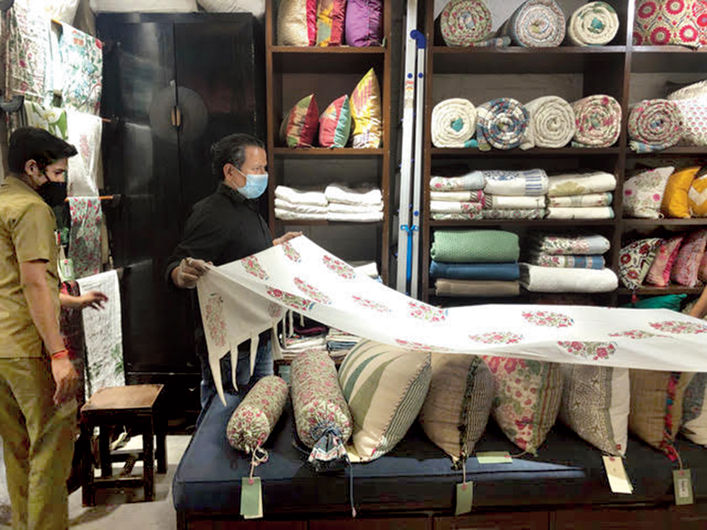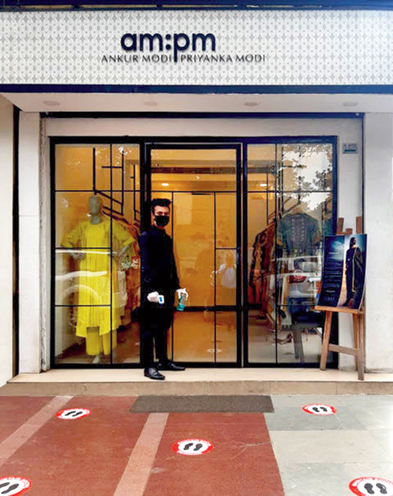With the changing phases of the country’s lockdown since March 25, I have perhaps revisited the Indian fashion fraternity’s take on it at least five times, each time talking to industry insiders to understand their perspective on different things — from shutting shop, extending a helping hand, business getting impacted, the changing face of the high-grossing Indian wedding industry to fashion weeks going digital. But simply by virtue of being a fashion enthusiast, the one phase I have looked forward to writing on the most is the one when the industry opens up after this undeniably difficult time. Yes, the timing of it is still debatable and yes, the uncertainty and worry since March have still remained largely unchanged, but what has also remained steadfast is the collective grit of the industry to make a comeback.
Talking Shop
While designers and brands are still reeling from an entire season rendered redundant, they are just starting to open up stores, especially in Calcutta, Delhi and Hyderabad. The online presence that all brands have had to bolster since Lockdown 1 still remains as the primary and preferred means of shopping but the physical stores have been equipped and adapted to fit the present-day need for safety and hygiene. While some like am:pm and Good Earth have cautiously opened their stores for walk-ins, some like Payal Khandwala and Amit Aggarwal are allowing visitors with appointments only at their respective Mumbai stores. However, masks and temperature checks are mandatory at all stores.

Inside Good Earth’s Khan Market store in Delhi, members of the staff are equipped to cater to customers while adhering to the safety norms. Sourced by the Telegraph
“Only a limited number of customers are allowed at a time in the shops and social distancing is being maintained. Customers are allowed to carry their belongings inside the store and any open bags are being taped. Customers are requested to refrain from touching surfaces in the store and avoid physical contact with any person as much as possible,” said a spokesperson for Good Earth, which has each of its stores in New Delhi (Khan Market and Select Citywalk), Bangalore, Jaipur, Chennai and Hyderabad getting sanitised every two hours.
“In order to provide a safe shopping environment, we are currently working with 33 per cent of our in-store staff and they are following stringent hygiene measures at every step,” explained Priyanka Modi, creative director, am:pm. Keeping track of the health of the staff is also being prioritised as Payal said, “We have masks, gloves, sanitisers and disinfectant sprays in place. We have only one housekeeping staff member (not on the shop floor) and only one member of our sales staff on the floor. They are all checked for temperature and with an oximeter when they begin their day.”
“While the standard prerequisites before entering the store include wearing a mask, having the Arogya Setu app on your phone and so on, the protocols inside the store are tightly outlined by allowing only two customers to shop at a time. We are also treating the health of our store staff as a priority and ensuring they are secured with modes such as digital payment and allowance of lesser people in the store to ensure quality care extended,” said Akanksha Arora, co-founder, Tribe Amrapali.
Trial and Caution
I have always been of the opinion that fashion must be felt first and then worn. But the present time is not or only selectively conducive to that sentiment with a public health emergency afloat. So that brought forth the very pertinent question of how the designers and brands were handling the precarious situation of trials. “The customers are requested to share their measurements at the store and our team suggests the appropriate size that would fit them. The customers are then asked to carry the merchandise home and try it inside the safety of their homes,” said Priyanka. am:pm is not allowing trials at their stores currently and hence has relaxed its exchange policies.
Adarsh Makharia of OSAA by Adarsh (that has stores in Topsia in Calcutta and Delhi), said, “We are offering trials only to customers who have purchased the outfits. Online, we are trying to provide a virtual shopping experience by offering innovative displays, installations, live sketches and swatches to make them more confident of their choices.” According to Akanksha, Tribe Amrapali is in the process of “finalising on a sanitisation machine which will clean all pieces, every single time they are tried”, so that they can start offering trials, which are not available at the moment.
The collective assertion, however, still leans towards a digital-only model of consumption, which might even serve as a premonition of things to come, irrespective of the pandemic. While some designers with e-commerce already in place from before are throwing in offers such as free shipping and contactless delivery, some are also using this time to launch their web operations. For instance, Payal has launched a virtual shopping experience with her seniormost client services executives personally guiding every shopper and offering customised sizing solutions for everyone. “This is done via telephone and video calls and includes 360-degree videos plus images of the products. Once a garment is selected or bought, our client services executive organises to have the pre-steamed garment (sealed in sanitised packaging) delivered to them via a local, contactless delivery service. All garments remain untouched for a minimum of 48 hours so that the clothes are safe to wear immediately. The client then has the option to keep the garment or return it within 24 hours for either an exchange or refund,” explained Payal. For now, this dedicated home-shopping service is available in both Mumbai and Bangalore.
Good Earth, which already had a thriving website, is now regrouping its focus there with a dedicated customer service team. “We encourage them to place orders on our web boutique or through WhatsApp and calls. Our personal shoppers and customer care team are available all day to assist them,” said their spokesperson.
Behind The Scenes
With demand slowly expected to begin picking up, even if in limited quantities, production could still lead to problems in this age of social distancing. “Ensuring the safety of our work family, educating everyone about guidelines and ensuring strict adherence to them is definitely our first priority. Regular temperature checks, masks and PPE kits are mandatory at all times for our staff, workers and karigars, along with cleaning of the shop floor periodically. Self-dispensing sanitisers and restrictions on sharing of tools are also being followed,” said Amit.
For Adarsh, a large workshop with ample space to allow for social distancing has come in handy. Meanwhile, what has worked for Tribe Amrapali is having a manufacturing unit in a larger industrial unit in Rajasthan where everyone has implemented the safety norms as community guidelines.
“The interesting part is that our manufacturing is part of a gem and jewellery zone in RIICO (Rajasthan State Industrial Development and Investment Corporation), which makes life easier because other workshops and factories around have been implementing the same guidelines and all the workers get used to these steps when they are aware of the rules implemented in the area,” said Akanksha.
Mumbai-based Vedika M. Sonthalia’s Calcutta production unit (of label Vedika M) has just started work and her solution to reduce exposure for her 12 workers and karigar is to arrange on-site accommodation for them for the time being. “My work unit is functioning in shifts and I have given them a separate space to live in and all the other paraphernalia required to keep them safe as they now work to complete old orders and to launch our new collection,” said the pret designer. Meanwhile, Payal is happy to wait it out for a little at her production unit in Mumbai. “Local trains have not started yet and we’re waiting to see how safe it is for our employees to travel these distances before we restart,” she added.
Road to Revival
“We will meet just twice a year to share the chapters of a new story. Irregular, joyful and absolutely free chapters, which will be written blending rules and genres, feeding on new spaces, linguistic codes and communication platforms,” said designer Alessandro Michele of Gucci recently, thereby embracing fashion sans boundaries. Joining the likes of Saint Laurent, Gucci has taken this pandemic as a clarion call of awakening to a more slow and sustainable process of fashion. While some brands in India have always led the sustainable way of life, others are also realising that this could well be the road ahead.
Despite the challenges, the industry is happy to start reopening stores and step up production, slowly but surely. Even if fashion designers and consumers have to make do with more of a digital experience for the foreseeable future in the form of the two biggest fashion weeks in the country opting for digital solutions and most designers encouraging online consultations and trials, we can all perhaps draw solace from the fact that fashion in whichever form may be can never go out of fashion.










